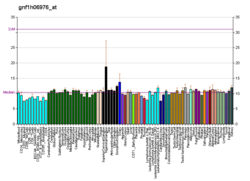Inactive dipeptidyl peptidase 10 is a protein that in humans is encoded by the DPP10 gene.[5][6][7] Alternate transcriptional splice variants, encoding different isoforms, have been characterized.[7]
Function
editThis gene encodes a single-pass type II membrane protein that is a member of the S9B family in clan SC of the serine proteases. This protein has no detectable protease activity, most likely due to the absence of the conserved serine residue normally present in the catalytic domain of serine proteases. However, it does bind specific voltage-gated potassium channels and alters their expression and biophysical properties.[7]
Clinical significance
editMutations in this gene have been associated with asthma[7] and autism spectrum disorders.[8]
References
edit- ^ a b c GRCh38: Ensembl release 89: ENSG00000175497 – Ensembl, May 2017
- ^ a b c GRCm38: Ensembl release 89: ENSMUSG00000036815 – Ensembl, May 2017
- ^ "Human PubMed Reference:". National Center for Biotechnology Information, U.S. National Library of Medicine.
- ^ "Mouse PubMed Reference:". National Center for Biotechnology Information, U.S. National Library of Medicine.
- ^ Nagase T, Kikuno R, Ishikawa K, Hirosawa M, Ohara O (Sep 2000). "Prediction of the coding sequences of unidentified human genes. XVII. The complete sequences of 100 new cDNA clones from brain which code for large proteins in vitro". DNA Res. 7 (2): 143–50. doi:10.1093/dnares/7.2.143. PMID 10819331.
- ^ Qi SY, Riviere PJ, Trojnar J, Junien JL, Akinsanya KO (Jun 2003). "Cloning and characterization of dipeptidyl peptidase 10, a new member of an emerging subgroup of serine proteases". Biochem J. 373 (Pt 1): 179–89. doi:10.1042/BJ20021914. PMC 1223468. PMID 12662155.
- ^ a b c d "Entrez Gene: DPP10 dipeptidyl-peptidase 10".
- ^ Girirajan S, Dennis MY, Baker C, Malig M, Coe BP, Campbell CD, Mark K, Vu TH, Alkan C, Cheng Z, Biesecker LG, Bernier R, Eichler EE (February 2013). "Refinement and discovery of new hotspots of copy-number variation associated with autism spectrum disorder". Am. J. Hum. Genet. 92 (2): 221–37. doi:10.1016/j.ajhg.2012.12.016. PMC 3567267. PMID 23375656.
Further reading
edit- Yamada R, Ymamoto K (2005). "Recent findings on genes associated with inflammatory disease". Mutat. Res. 573 (1–2): 136–51. doi:10.1016/j.mrfmmm.2004.06.061. PMID 15829243.
- Chen T, Ajami K, McCaughan GW, Gorrell MD, Abbott CA (2003). "Dipeptidyl Peptidase IV Gene Family". Dipeptidyl peptidase IV gene family. The DPIV family. Adv. Exp. Med. Biol. Vol. 524. Springer. pp. 79–86. doi:10.1007/0-306-47920-6_10. ISBN 9780306479205. PMID 12675227.
- Allen M, Heinzmann A, Noguchi E, Abecasis G, Broxholme J, Ponting CP, Bhattacharyya S, Tinsley J, Zhang Y, Holt R, Jones EY, Lench N, Carey A, Jones H, Dickens NJ, Dimon C, Nicholls R, Baker C, Xue L, Townsend E, Kabesch M, Weiland SK, Carr D, von Mutius E, Adcock IM, Barnes PJ, Lathrop GM, Edwards M, Moffatt MF, Cookson WO (November 2003). "Positional cloning of a novel gene influencing asthma from chromosome 2q14". Nat. Genet. 35 (3): 258–63. doi:10.1038/ng1256. PMID 14566338. S2CID 40595323.
- Jerng HH, Qian Y, Pfaffinger PJ (2005). "Modulation of Kv4.2 channel expression and gating by dipeptidyl peptidase 10 (DPP10)". Biophys. J. 87 (4): 2380–96. doi:10.1529/biophysj.104.042358. PMC 1304660. PMID 15454437.
- Zagha E, Ozaita A, Chang SY, Nadal MS, Lin U, Saganich MJ, McCormack T, Akinsanya KO, Qi SY, Rudy B (May 2005). "DPP10 modulates Kv4-mediated A-type potassium channels". J. Biol. Chem. 280 (19): 18853–61. doi:10.1074/jbc.M410613200. PMID 15671030.
- Ren X, Hayashi Y, Yoshimura N, Takimoto K (2005). "Transmembrane interaction mediates complex formation between peptidase homologues and Kv4 channels". Mol. Cell. Neurosci. 29 (2): 320–32. doi:10.1016/j.mcn.2005.02.003. PMID 15911355. S2CID 34065803.
- Chen T, Ajami K, McCaughan GW, Gai WP, Gorrell MD, Abbott CA (January 2006). "Molecular characterization of a novel dipeptidyl peptidase like 2-short form (DPL2-s) that is highly expressed in the brain and lacks dipeptidyl peptidase activity". Biochim. Biophys. Acta. 1764 (1): 33–43. doi:10.1016/j.bbapap.2005.09.013. PMID 16290253.
- Takimoto K, Hayashi Y, Ren X, Yoshimura N (2006). "Species and tissue differences in the expression of DPPY splicing variants". Biochem. Biophys. Res. Commun. 348 (3): 1094–100. doi:10.1016/j.bbrc.2006.07.157. PMID 16899223.
- Jerng HH, Lauver AD, Pfaffinger PJ (2007). "DPP10 splice variants are localized in distinct neuronal populations and act to differentially regulate the inactivation properties of Kv4-based ion channels". Mol. Cell. Neurosci. 35 (4): 604–24. doi:10.1016/j.mcn.2007.03.008. PMC 3674967. PMID 17475505.
- Hersh CP, Raby BA, Soto-Quirós ME, Murphy AJ, Avila L, Lasky-Su J, Sylvia JS, Klanderman BJ, Lange C, Weiss ST, Celedón JC (November 2007). "Comprehensive testing of positionally cloned asthma genes in two populations". Am. J. Respir. Crit. Care Med. 176 (9): 849–57. doi:10.1164/rccm.200704-592OC. PMC 2048676. PMID 17702965.





